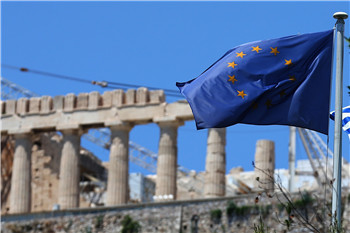1998年2月一个阴郁的晚上,我正在写英国《金融时报》的汇市报告。当天没什么事值得一提,我还差150词。绝望之下,我快速翻看着一堆被压在传真机底下的银行传真。我发现其中一份来自高盛(Goldman Sachs)传真,文中援引了其经济学家吉姆•奥尼尔(Jim O'Neill)抨击弱势的希腊货币德拉马克的言论。奥尼尔当时是汇市之神,于是我把他的话贴在了那篇专栏的结尾,然后就回家了。报社大楼里收入最低的记者不会呆到很晚。
One gloomy February evening in 1998 I was writing the FT’s currency market report. Nothing had happened that day, and I was 150 words short. In desperation, I leafed through the pile of bank faxes buried under the fax machine. I found one from Goldman Sachs that quoted their economist Jim O’Neill savaging the humble Greek drachma. O’Neill was the god of the currency market so I stuck his pronouncements at the end of my column and went home. The lowest-paid journalist in the building didn’t stay late.
正如市场多数人一样,之后我就再次遗忘了德拉马克。但是,几天后我发现德拉马克遭到了持续攻击。希腊央行把罪责归咎于我的文章。攻击仍在持续。在3月的一个周五,希腊突然决定加入欧洲汇率机制(ERM)——进入欧元区的门户。交易员们震惊了。没错,不久前希腊官方经济统计表现出不可思议的起色,但是希腊仍然未达到加入单一货币的任何一条标准。尽管如此,2001年希腊正式加入了欧元区。有时我会想象自己的讣告标题是:“为希腊加入欧元起到了推波助澜的作用。”
Like most people in the market, I then forgot the drachma again. But, some days later, I noticed that it was under sustained attack. The Greek central bank blamed my article. The attacks continued. One Friday that March, Greece suddenly decided to join the European Exchange Rate Mechanism — the entry gate to the euro. Traders were astonished. True, recent Greek official economic stats had shown mysterious improvements but Greece still met none of the criteria for joining the currency. Regardless, in 2001 Greece joined. I sometimes imagine the headline over my obituary: “Helped get Greece into euro.”
在见证了这个烂摊子的源起后,我想到了欧洲怎样才可能在未来避免类似的错误。
Having witnessed the genesis of this mess, I have a sense of how Europe might avoid similar mistakes in future.
之前几十年,政策制定者一直在考虑建立一种欧洲货币。但是,该项目直到1989年柏林墙被推倒后、在各种情绪交织的令人困惑的那几周才启动。德国人希望重新统一。时任法国总统的弗朗索瓦•密特朗(François Mitterrand)称,如果他们支持他所钟情的欧元项目,他就会支持德国统一。正如戴维•马什(David Marsh)在《欧元》(The Euro)中所记叙的,密特朗和时任西德总理赫尔穆特•科尔(Helmut Kohl)在1989年末达成了“推动欧洲最终结成马斯特里赫特货币联盟的前期协议。”(《欧洲联盟条约》于1991年在荷兰马斯特里赫特(Maastricht)签订——译者注)
Policy makers had been pondering a European currency for decades. But the project only took off in 1989, in the confusing emotional weeks after the Berlin Wall fell. Germans wanted reunification. The French president François Mitterrand said he’d agree if they backed his pet project: the euro. In late 1989, writes David Marsh in The Euro, Mitterrand and West Germany’s chancellor Helmut Kohl did “the essential deal that launched Europe on to the Maastricht monetary union path”.
两位领导人并非受经济动机驱使。1989年时担任德国央行(Bundesbank)行长的卡尔•奥托•波尔(Karl Otto Pöhl)曾向英国《金融时报》透露,科尔对经济一窍不通。相反,密特朗和科尔关心的是历史。科尔希望成为见证德国统一的总理;而密特朗想要打造一个由法国主导的欧洲。他们把经济学家视为阻挡历史潮流的人,用专业术语胡说八道。
The two leaders weren’t driven by economic motives. Karl Otto Pöhl, Bundesbank president in 1989, once told the FT that Kohl understood nothing of economics. Rather, Mitterrand and Kohl cared about history. Kohl wanted to be the chancellor of German unity; Mitterrand, to forge a French-led Europe. They saw economists as people standing in the way of history, bleating jargon.
当我在1996年成为英国《金融时报》的汇市专栏作家时,密特朗已经去世了。较为次要的欧元之父们也已经离开:就连公务员也很少能在高层呆5年以上。新的一批官僚在实施这个宏伟计划。
When I became FT currency columnist in 1996, Mitterrand was already dead. Lesser fathers of the euro had moved on too: even bureaucrats rarely last more than five years at the top. A new set of wonks was implementing the grand design.
但是,多数人是迷迷糊糊地加入这个项目的。连汇市也被欧洲货币联盟搞烦了。1996-98年期间,我常常坐在办公室的转椅上旋转思考,与银行界人士共享午餐,试着填满我的专栏篇幅。这很棘手:1996年或许是自1973年以来汇市最平静的一年。在一个特别无聊的日子,法国巴黎银行(BNP Paribas)的尼克•帕森斯(Nick Parsons)跟我说:“我们唯一没在等待的就是戈多。(《等待戈多》是一出荒诞剧——译者注)”
But most people sleepwalked into this project. Even the currency markets were bored by European monetary union. I spent the years 1996-98 swivelling around in my office chair, having lunch with bankers, and trying to fill my column. This was tricky: 1996 was perhaps the slowest year in currencies since 1973. One particularly dead day, Nick Parsons at Paribas told me: “The only thing we’re not waiting for is Godot.”
我的文章通常刊登在报纸第33版。当希腊和意大利等不太像样的国家加入ERM时,这种无聊感也没能消散。希腊的加入甚至都没能让我的文章进入头版。希腊加入的部分原因只是为了解决一个短期问题:加入ERM有助于修复德拉马克兑其他欧洲货币的汇率,从而遏止市场攻击。多数交易员几乎都没留意到。他们的职责不是惦记小小的希腊。他们只是把这看作一个好玩的小情节:希腊人走运加入欧元,现在没事了。
My stuff usually appeared on page 33. The boredom hardly lifted when improbable countries such as Greece and Italy entered the ERM. Greece’s entry didn’t even get me on to the front page. The Greeks joined partly just to solve a short-term problem: entering the ERM helped fix the drachma’s rate against other European currencies, and thus stopped the market’s attack. Most traders scarcely noticed. They weren’t paid to think about little Greece. They saw it as merely an amusing subplot: the Greeks had lucked into the euro and would now be fine.
“希腊经济太小了,不足以让其他国家过多考虑德拉马克的币值,”我当时写道。当时没人能想到(或者在意)希腊加入欧元区有一天会成为欧洲最大的麻烦。1998年市场上几乎没人问:“欧元能行吗?”他们把这视为一个长期问题,出问题时他们可能都去世了,或者运气够好的话,在托斯卡纳他们自己的庄园酿造葡萄酒。交易员的问题是这样的:“希腊明日加入ERM会影响德国马克的汇率吗?”
“Greece’s economy is too small for any other country to care much about the price of the drachma”, I wrote. Nobody then imagined (or perhaps cared) that Greek entry into the euro would one day produce Europe’s biggest headache. Few in the markets in 1998 asked: “Will the euro work?” They considered that an issue for the long run, when they would all be dead or, with luck, growing wine on their own estates in Tuscany. Instead, traders asked questions like: “Will Greek ERM entry tomorrow move the Deutschmark?”
政客们根本不管这类技术问题。他们倾向于把欧元视为一个政治项目——“打造欧洲”。我们现在知道欧元起到的作用恰好其反:它终结了1955年在意大利墨西拿(Messina)起步的欧洲建设。如今这个欧洲项目的内涵是试着消化欧元。
Politicians barely noticed such technicalities at all. They tended to see the euro as a political project: “building Europe”. We now know the euro did the opposite: it ended the construction of Europe that had begun in Messina in 1955. Today the European project consists of trying to digest the euro.
欧元是个有远见的项目。政客们应该学到的关键教训是:当心远见。未来很可能搅乱你的远见。与其跳跃式迈出不可逆转的巨大步伐,不如回顾过去,采取循证的分析方式:以前有什么枯燥复杂的政策在其他地方奏效过?鉴于1989年的欧洲刚刚经历了其血腥历史中最美好的40年,各方本应该打消创造一种新货币的念头。
The euro was a visionary project. The key lesson for politicians: beware of vision. The future will probably mess up your vision. Instead of taking giant irreversible leaps, be backward-looking and evidence-based: what boring complex policy worked somewhere before? Given that Europe in 1989 was coming off the best 40 years in its blood-soaked history, the bias should have been to leave well alone instead of inventing a currency.
在柏林墙被推倒后那段各种情绪交织的令人困惑的时期,“远见”格外危险。西方遭遇的下一个这样的时刻——9/11恐怖袭击,带来了伊拉克战争、不受限制的间谍活动以及关塔那摩等重大失策。这与2008年雷曼兄弟(Lehman Brothers)破产后的疯狂几周酿成下一代人的大麻烦十分相似。在可能的情况下,静候危机结束会好得多,正如安格拉•默克尔(Angela Merkel)试着去做的那样。当今这一代政客招致诸多批评,但至少他们没有任何远见。
“Vision” is particularly dangerous at confusing emotional moments such as the fall of the Berlin Wall. The west’s next great confusing emotional moment, the attacks of 9/11, produced blunders including the Iraq war, limitless spying and Guantánamo. Quite likely the frantic weeks after Lehman Brothers’ collapse in 2008 spawned the next generation’s headaches. Much better when possible to wait out crises, as Angela Merkel tries to do. Today’s politicians take a lot of stick, but at least they don’t have any vision.
